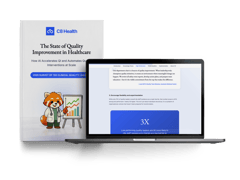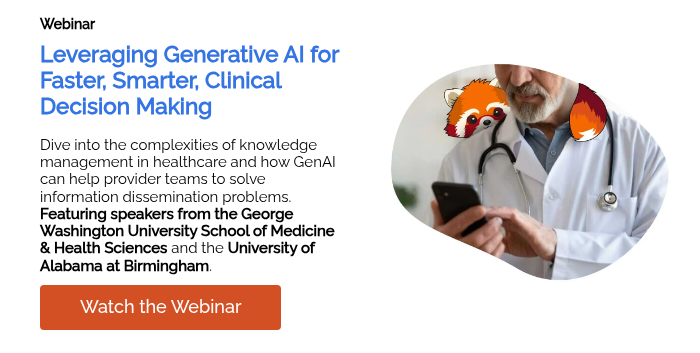
Revolutionizing Hospital Documentation Systems with AI and Smart Formats
Hospital documentation-once bogged down by paper charts, handwritten notes, printed guidelines, and painstaking dictation-has been slow to embrace digital formats. But the rapid advancements in AI and smart templates are ushering in a digital transformation of clinical paperwork. This shift is turning old-school methods into reliable, efficient systems.
Let’s explore how AI and smart formats are revolutionizing hospital documentation systems.
Meet the Expert
Mical DeBrow is an accomplished healthcare leader and clinician with extensive expertise spanning pharma, healthcare payers and providers, and healthcare information technology.
» Looking to consolidate all your healthcare knowledge in one system? Check out C8 Health's features.
6 Ways AI and Smart Formats Are Revolutionizing Hospital Documentation
1. Real-Time Dictation and Information Sharing
I remember a time when we used to dictate information into a recording device and have it transcribed by a person in another department. This often meant round after round of corrections, additions, and deletions.
Now, thanks to AI, we can dictate or share info in real-time, making the documentation process smoother and reducing errors. This means everyone on the healthcare team has access to the most up-to-date patient info, helping them provide the best care.
2. Auto-Generated Information Integration
Auto-generated information, validated by a clinician, streamlines processes and lightens the workload for clinicians. This is especially helpful when all systems-dictation, laboratory, pharmacy, radiology-auto-send information to the record-keeping system.
The integration of complete, accurate information leads to better outcomes and gives the entire care team a full picture of the patient's health. It's a more efficient, accurate way of handling healthcare documentation.
Our latest webinar can show you how to leverage these capabilities alongside other forms of generative AI to enable faster decision making.
3. Enhanced Documentation in Surgery
AI can help by accurately recording real-time events in the surgical suite, resulting in more precise and reliable documentation.
Traditionally, surgeons had to rely on memory recall for documenting surgical procedures, which is inherently flawed due to the potential for human error. However, with AI, the actual events in the surgical suite are recorded in real-time, eliminating the need for memory recall and reducing the risk of inaccuracies.
With a complete and accurate record of the surgical procedure, healthcare providers can make more informed decisions and provide better post-operative care.
4. Accelerated Diagnosis with AI
AI also speeds up the time to diagnosis. We no longer need weeks; we need minutes. Sometimes, we don't even need that much time because AI can pull together information from various sources in one place at one time.
AI-powered diagnostic tools can analyze large amounts of data and identify patterns that may be difficult for humans to detect, leading to more accurate diagnoses and more effective treatment decisions. The technology can help to detect certain conditions earlier, which can lead to earlier diagnosis and treatment.
5. Operational Efficiency with AI-Powered Knowledge
In my opinion, operational efficiency is wedded to better documentation. The business of healthcare is an information business and more accurate information, in a more timely (near real-time) results in less waste and repetition, not to mention, the search for data.
AI-driven knowledge bases can assist medical professionals in accessing up-to-date research findings and treatment guidelines effectively, leading to better patient outcomes and informed decisions regarding care.
6. Time-Saving with Smart Formats and NLP
Smart formats and natural language processing (NLP) save time and improve accuracy. Smart formats are structured templates for quick, organized data entry, capturing critical patient details. NLP interprets human language, enabling machines to read, decipher, understand, and make sense of the unstructured data in patient records.
In the past, clinicians, including myself when I first started, would spend minutes deciding how to describe something. Now, with NLP and AI, the format, wording, and word choice become easy to select, making documentation a much smarter and more efficient process.
Anesthesiologist Max Feinstein M.D. explains the benefits of smart formats:
Challenges and Solutions in Adopting AI Documentation Systems in Hospitals
Overcoming Clinician Resistance
Although AI has many benefits, convincing clinicians to trust it for decision-making is difficult. However, gradual adoption and education can help overcome this challenge.
AI can improve healthcare decision-making without threatening clinician expertise. To integrate AI successfully, addressing clinician concerns and promoting an understanding of its benefits is essential.
Bridging Technology Platforms
Another challenge lies in the disconnect between different technology platforms within healthcare systems. To ensure efficient and widespread acceptance of AI, a unified platform must be created to enable seamless communication among systems. Addressing this challenge is pivotal for successfully integrating AI into healthcare settings.
The Future of Hospital Documentation
Addressing the challenge of technology platform disconnect is where C8 Health comes into play. C8 Health's unified platform breaks down knowledge silos within and between departments. What's more, its smart formatting technology ensures that documentation is easily searchable, readable, and useable across devices, regardless of the original format.
You can use the platform to easily access locally vetted, up-to-date guidance. This streamlines best practices, coordinates care, and empowers healthcare providers to make quick and safe decisions at the point of service. By making best practices available to everyone, everywhere, C8Health can successfully integrate AI into healthcare settings.


